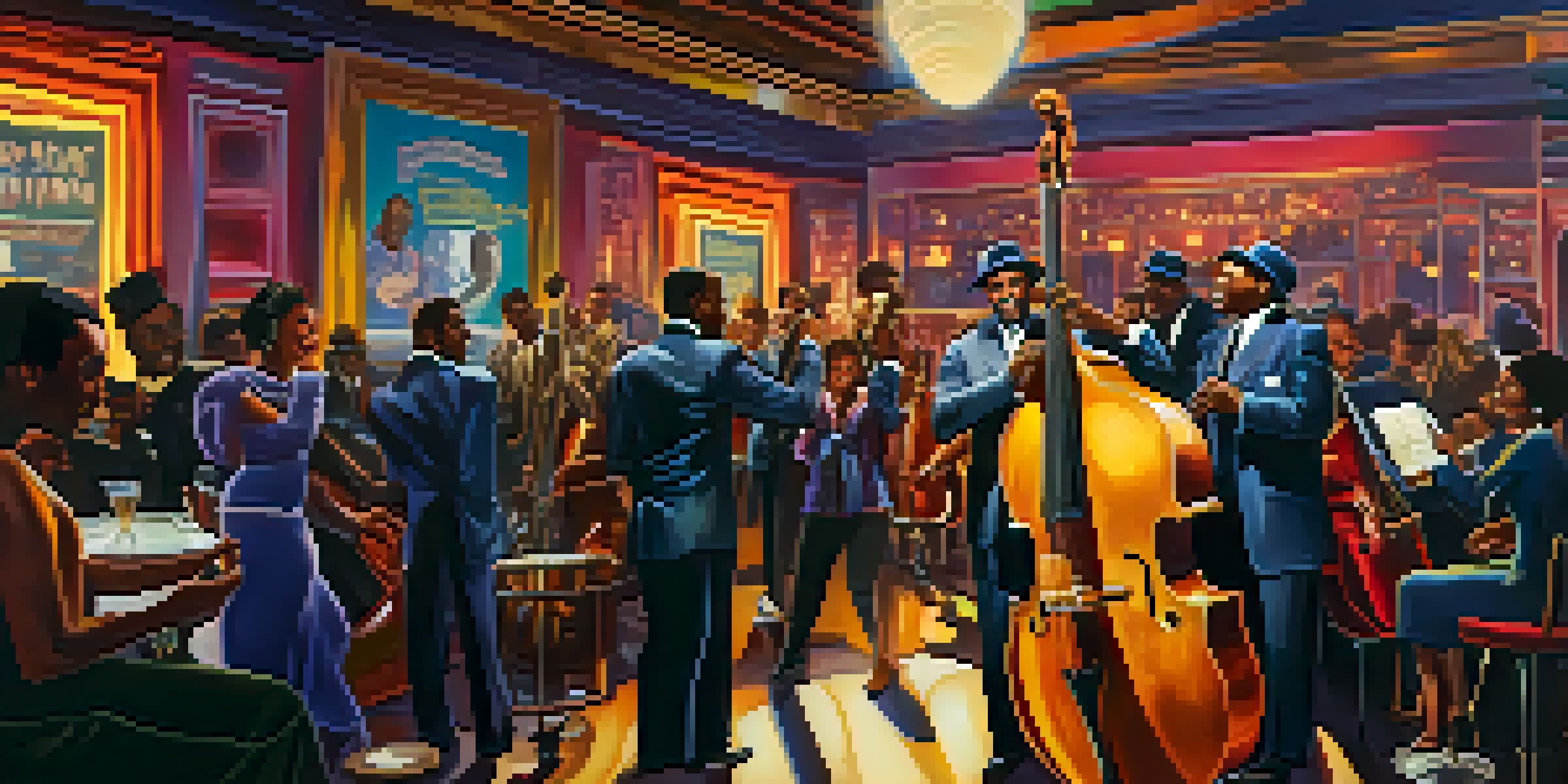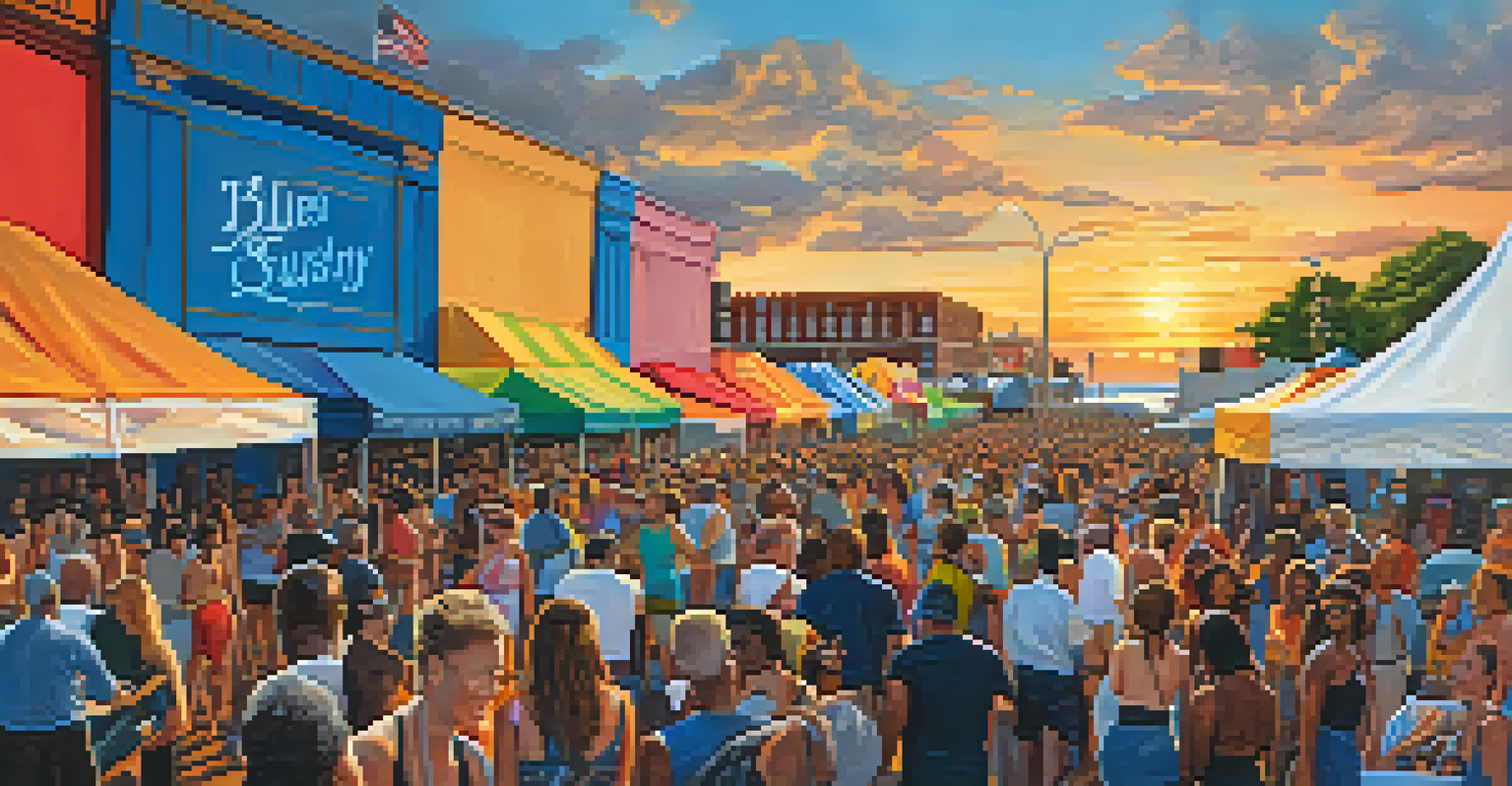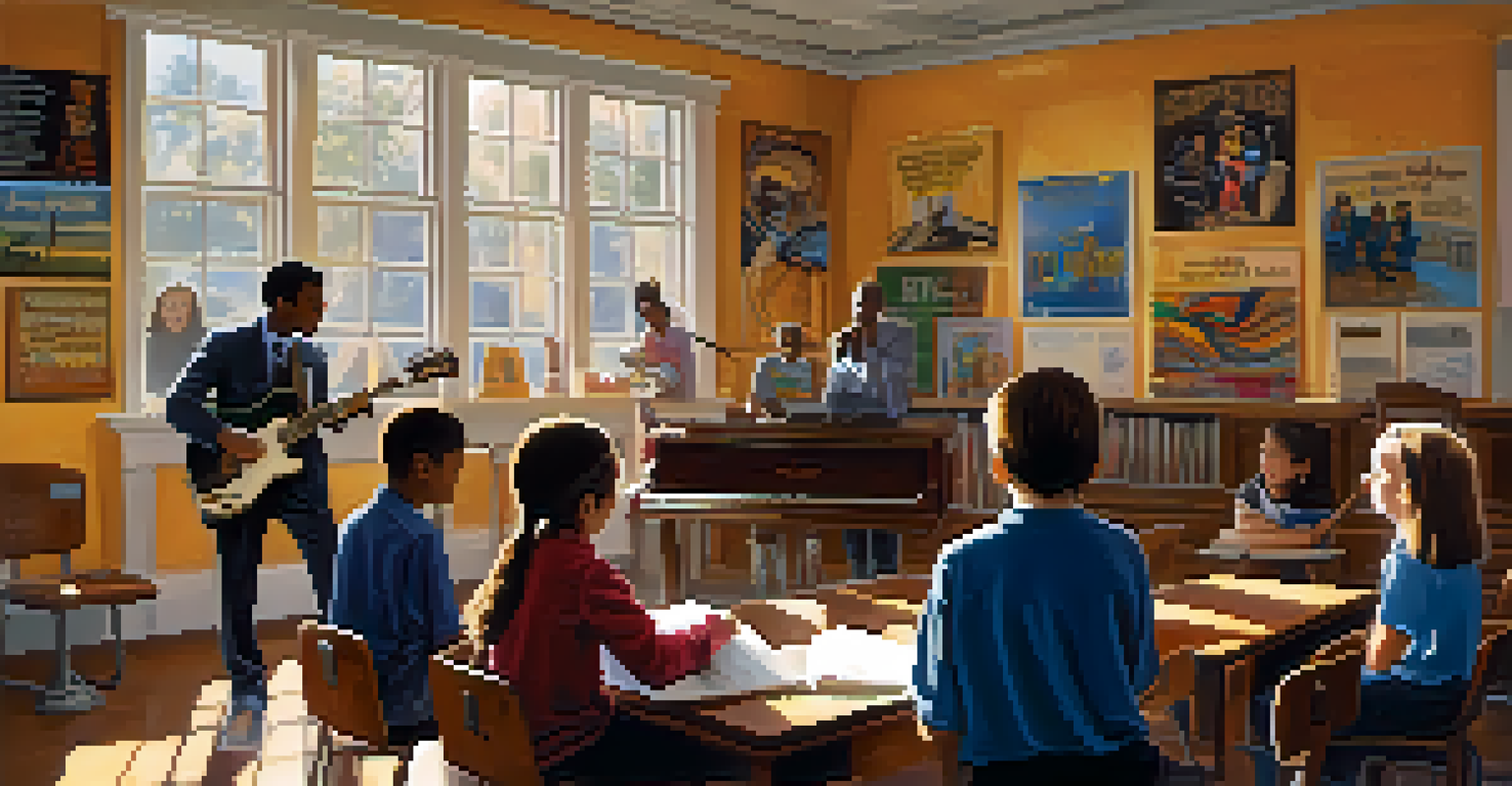New Jersey's Role in the Development of Jazz and Blues

The Birthplace of Jazz: Newark's Musical Scene
Newark, New Jersey, played a pivotal role in the early development of jazz. In the early 20th century, the city became a melting pot of cultures, where African American musicians could share their creative talents. This vibrant environment helped cultivate a rich musical landscape that would set the stage for jazz's rise.
Jazz is the music of the people, and it is the music of our times.
Jazz clubs and dance halls sprang up throughout Newark, providing spaces for artists like Wayne Shorter and Sarah Vaughan to hone their craft. These venues not only showcased local talent but also attracted musicians from New Orleans, further enriching the local music scene. As a result, Newark became known as a breeding ground for innovative jazz styles.
The influence of Newark's jazz scene extended beyond its borders, impacting musicians nationwide. Many artists who performed in Newark went on to achieve national fame, carrying the city's musical legacy with them. This deep-rooted connection to jazz continues to resonate within New Jersey's cultural identity.
The Blues Influence: Asbury Park's Musical Heritage
Asbury Park, often recognized for its beautiful boardwalk, has also made significant contributions to the blues genre. The city became a hotspot for blues musicians during the 1960s, particularly with the rise of the Jersey Shore sound. Local venues like The Stone Pony provided a platform for emerging blues and rock artists.

Musicians such as Bruce Springsteen and Southside Johnny Lyon emerged from this vibrant scene, blending blues elements with rock influences. Their music not only celebrated the blues but also introduced it to a new generation of fans. Asbury Park's commitment to live music continues to keep the blues spirit alive.
Newark's Jazz Legacy Shaped Culture
Newark's vibrant jazz scene in the early 20th century cultivated influential artists, establishing the city's significant role in jazz history.
In recent years, the Asbury Park Music and Arts Festival has further highlighted the city's blues heritage. This annual event attracts both local and national talent, creating an atmosphere where blues fans can celebrate their favorite genre. The festival exemplifies how Asbury Park remains a vital part of the blues narrative.
Key Figures in New Jersey's Jazz and Blues Evolution
New Jersey has produced numerous influential musicians who have shaped jazz and blues. Artists like Count Basie, who hailed from Red Bank, revolutionized big band jazz with his innovative arrangements and energetic performances. His impact is still felt in modern jazz today.
The blues is a feeling; it’s not a genre. It’s a way of expressing what you feel inside.
Similarly, the legendary Billie Holiday spent part of her childhood in Newark, where she developed her unique vocal style. Her emotional depth and ability to convey stories through song made her one of the most iconic jazz singers of all time. Both Basie and Holiday exemplify the profound talent that emerged from New Jersey.
These musicians not only contributed to their genres but also paved the way for future generations. Their legacies inspire young artists to explore jazz and blues, ensuring that New Jersey's rich musical history continues to thrive.
The Role of New Jersey's Venues in Shaping Music
The various music venues throughout New Jersey have played a critical role in nurturing jazz and blues talent. From the historic clubs in Newark to the vibrant stages in Asbury Park, these locations have provided a platform for artists to showcase their skills. The intimate settings often allow for a personal connection between the performer and the audience.
Venues like the Count Basie Center for the Arts in Red Bank and the New Jersey Performing Arts Center in Newark have hosted countless performances. These spaces not only highlight established artists but also give newcomers a chance to shine. The support for live music fosters a sense of community and encourages artistic growth.
Asbury Park: A Blues Hotspot
Asbury Park became a key player in the blues genre during the 1960s, fostering talent like Bruce Springsteen and maintaining a dedication to live music.
Furthermore, these venues often celebrate the state's musical heritage through festivals and tribute concerts. By honoring the past while promoting contemporary artists, New Jersey's music scene remains vibrant and relevant. This commitment to live music ensures that jazz and blues will continue to flourish in the Garden State.
Jazz and Blues Festivals: Celebrating New Jersey's Music Scene
New Jersey hosts a variety of jazz and blues festivals that celebrate the state's rich musical heritage. Events like the Montclair Jazz Festival and the Cape May Jazz Festival attract both local and international talent, creating a dynamic atmosphere for music lovers. These festivals offer a unique opportunity to experience live performances in a festive environment.
Attendees can enjoy a range of genres, from traditional jazz to contemporary blues, showcasing the diversity within these musical styles. The festivals not only provide entertainment but also promote community engagement and cultural appreciation. They serve as a reminder of New Jersey's significant contributions to the music world.
Moreover, these events often feature educational components, such as workshops and discussions with musicians. This emphasis on learning helps to inspire future generations of artists and fans, ensuring that the legacy of jazz and blues in New Jersey continues to thrive. Festivals play a crucial role in keeping the state's musical spirit alive.
The Influence of New Jersey Artists on National Music Trends
New Jersey artists have consistently influenced national music trends, particularly in jazz and blues. The unique blending of different musical styles and cultural influences has allowed New Jersey musicians to create innovative sounds that resonate with audiences far beyond the state's borders. This creative fusion has helped to shape the evolution of both genres.
For example, artists like Jon Batiste have brought jazz to the forefront of popular culture, earning Grammy Awards and recognition for their contributions. Batiste's work blends traditional jazz elements with modern influences, showcasing the ongoing evolution of the genre. Such artists continue to highlight New Jersey's role in shaping the music landscape.
Festivals Celebrate Musical Heritage
New Jersey's jazz and blues festivals promote cultural appreciation and community engagement while highlighting the state's rich musical contributions.
In addition, the state's rich history of music education and community programs has nurtured countless musicians. These resources ensure that the next generation of artists can build on the foundations laid by their predecessors. New Jersey's artistic legacy will undoubtedly continue to inspire future musicians and contribute to the global music scene.
Preserving New Jersey's Jazz and Blues Legacy
Preserving New Jersey's jazz and blues legacy is essential for future generations. Efforts to archive recordings, promote historical venues, and celebrate local musicians help to ensure that the state's rich musical history is not forgotten. Organizations dedicated to this mission play a crucial role in maintaining the cultural significance of these genres.
Educational programs in schools and community centers also contribute to this preservation. By introducing students to the history and techniques of jazz and blues, these initiatives foster a deeper appreciation for the music. Encouraging young people to explore these genres helps to sustain their relevance in today's music landscape.

Moreover, collaborations between musicians and local organizations can raise awareness and support for this cause. Events that celebrate New Jersey's musical roots can inspire pride and foster a sense of community among residents. By working together, we can ensure that the legacy of jazz and blues in New Jersey continues to thrive for years to come.